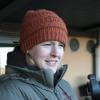With new technologies revolutionizing data collection, wildlife researchers are becoming increasingly able to collect data at much higher volumes than ever before. Now we are facing the challenges of putting this information to use, bringing the science of big data into the conservation arena. With the help of machine learning tools, this area holds immense potential for conservation practices. The applications range from online trafficking alerts to species-specific early warning systems to efficient movement and biodiversity monitoring and beyond.
However, the process of building effective machine learning tools depends upon large amounts of standardized training data, and conservationists currently lack an established system for standardization. How to best develop such a system and incentivize data sharing are questions at the forefront of this work. There are currently multiple AI-based conservation initiatives, including Wildlife Insights and WildBook, that are pioneering applications on this front.
This group is the perfect place to ask all your AI-related questions, no matter your skill level or previous familiarity! You'll find resources, meet other members with similar questions and experts who can answer them, and engage in exciting collaborative opportunities together.
Just getting started with AI in conservation? Check out our introduction tutorial, How Do I Train My First Machine Learning Model? with Daniel Situnayake, and our Virtual Meetup on Big Data. If you're coming from the more technical side of AI/ML, Sara Beery runs an AI for Conservation slack channel that might be of interest. Message her for an invite.
Header Image: Dr Claire Burke / @CBurkeSci

Explore the Basics: AI
Understanding the possibilities for incorporating new technology into your work can feel overwhelming. With so many tools available, so many resources to keep up with, and so many innovative projects happening around the world and in our community, it's easy to lose sight of how and why these new technologies matter, and how they can be practically applied to your projects.
Machine learning has huge potential in conservation tech, and its applications are growing every day! But the tradeoff of that potential is a big learning curve - or so it seems to those starting out with this powerful tool!
To help you explore the potential of AI (and prepare for some of our upcoming AI-themed events!), we've compiled simple, key resources, conversations, and videos to highlight the possibilities:
Three Resources for Beginners:
- Everything I know about Machine Learning and Camera Traps, Dan Morris | Resource library, camera traps, machine learning
- Using Computer Vision to Protect Endangered Species, Kasim Rafiq | Machine learning, data analysis, big cats
- Resource: WildID | WildID
Three Forum Threads for Beginners:
- I made an open-source tool to help you sort camera trap images | Petar Gyurov, Camera Traps
- Batch / Automated Cloud Processing | Chris Nicolas, Acoustic Monitoring
- Looking for help with camera trapping for Jaguars: Software for species ID and database building | Carmina Gutierrez, AI for Conservation
Three Tutorials for Beginners:
- How do I get started using machine learning for my camera traps? | Sara Beery, Tech Tutors
- How do I train my first machine learning model? | Daniel Situnayake, Tech Tutors
- Big Data in Conservation | Dave Thau, Dan Morris, Sarah Davidson, Virtual Meetups
Want to know more about AI, or have your specific machine learning questions answered by experts in the WILDLABS community? Make sure you join the conversation in our AI for Conservation group!
No showcases have been added to this group yet.
- @SrinivasSivakumar
- | none
I am a an Engineer at Wild Life Conservation Trust, India looking to build some tech for the WildLife.
- 0 Resources
- 0 Discussions
- 2 Groups
- @katerakelly
- | she/her
I am a machine learning researcher (PhD UC Berkeley 2021) looking for opportunities to use my skills to help combat and mitigate climate change and support biodiversity. Research experience in few-shot learning, image recognition, and reinforcement learning.
- 0 Resources
- 0 Discussions
- 1 Groups
Durrell Institute of Conservation and Ecology (DICE), University of Kent
Conservation Science PhD student at DICE, Kent. I am a GIS and remote sensing enthusiast as well as researcher. Been in love with the interaction between AI and conservation ever since I picked up a python crash course book out of curiosity during my undergraduate degree.
- 0 Resources
- 0 Discussions
- 12 Groups
Conservation Director, Texas with National Audubon Society
- 0 Resources
- 4 Discussions
- 3 Groups
- 0 Resources
- 0 Discussions
- 3 Groups
- @pchwalek
- | He/him/his
I'm a PhD candidate in the Responsive Environments Group, working on electronic systems for human and wildlife monitoring.



- 0 Resources
- 18 Discussions
- 9 Groups
I am a scientist with research background in evolutionary-ecological genomics and have impact at the senate level to prevent a government viral biocontrol release. UK based and looking to connect with passionate dreamers ready to shift paradigms
- 0 Resources
- 3 Discussions
- 9 Groups
- @LauraKloepper
- | she/her
Associate Professor at the University of New Hampshire. Our research aims to uncover behavioral principles underlying acoustic sensing, inspire the design of active sensing technology, and improve population monitoring for animal conservation.

- 1 Resources
- 3 Discussions
- 5 Groups
- @reny.tyson.moore
- | She/Her/Hers
- 0 Resources
- 0 Discussions
- 4 Groups
Tech-Driven Conservation with a Wild Twist

- 0 Resources
- 1 Discussions
- 8 Groups
- 0 Resources
- 0 Discussions
- 14 Groups
- @Thorondor
- | He/Him
AI engineering working on cutting edge AI research and product for detecting objects. Big wildlife and conservation enthusiast and amateur wildlife photographer.
- 0 Resources
- 0 Discussions
- 2 Groups
Jacqueline Ramos explains how artificial intelligence can help to track and prevent chimpanzee trafficking across the globe.
6 February 2019
The Open Data Institute and the Office for AI are partnering to explore how data trusts could help to solve environmental, societal and industry challenges by enabling increased access to data while retaining trust....
31 January 2019
With the aim of advancing rewildling-related technology in the UK and introducing new talent and ideas into the field of rewildling, Ecosulis is thrilled to announce the launch of their first ever Rewilding Tech...
14 January 2019
A team of Brazilian biologists supported by the Conservation Leadership Programme (CLP) is unlocking the secrets of one of the world’s most fragile and threatened biodiversity hotspots thanks to the success of a...
22 November 2018
Ted Schmitt joined us for a lunchtime lecture in which he shared his experiences working across Africa the past five years with protected area managers, anti-trafficking organisations, and scientists to effectively...
22 November 2018
Machine learning is widely recognized as the solution to camera trap data processing, but a user-friendly and broadly-accessible system for putting this tech to use has not yet been developed. In this case study,...
1 October 2018
Article
In this case study, conservation ecologist Ayesha Tulloch takes us behind the scenes of her recent paper, which came out in Nature Ecology & Evolution earlier this month. In this paper, Ayesha and her team present a...
20 August 2018
The winners of our Human Wildlife Conflict Tech Challenge are offering regular updates throughout the year to chronicle their failures, successes and what they learn along the way as they develop their solutions. In...
27 July 2018
Looking to prototype or pilot a new conservation tech idea or approach? Conservation X Labs is running an idea competition for teams to create a first draft (i.e. prototype) of their conservation solution. 20 finalists...
11 June 2018
Conflict between humans and wildlife is increasing as human communities expand and wild habitats are destroyed, prompting need for new mitigation techniques. As a winner of the Human Wildlife Conflict Tech Challenge,...
19 April 2018
Hundreds of people joined our #Tech4Wildlife photo challenge this year, showcasing all the incredible ways tech is being used to support wildlife conservation. We've seen proximity loggers on Tasmanian Devils in...
3 March 2018
Following the UK Government’s landmark announcement of plans to introduce a complete ban on the domestic trade in ivory, it was fitting that a new machine learning product designed to tackle the supply end of this...
6 December 2017
August 2025
event
September 2025
event
event
event
event
October 2025
event
event
event
December 2025
event
March 2026
November 2023
event
17 Products
Recently updated products
| Description | Activity | Replies | Groups | Updated |
|---|---|---|---|---|
| Environment conservation in Great Rift Valley. |
|
AI for Conservation | 1 day 16 hours ago | |
| Hi Chris! Send me a direct message and we can have a chat! |
+5
|
AI for Conservation, Autonomous Camera Traps for Insects, Camera Traps | 2 days 4 hours ago | |
| Hey people of the world. 10 days ago I posted here about our new GUI tool where one could drag-n-drop an image and get animals detected on... |
|
AI for Conservation | 2 days 23 hours ago | |
| Hi @CourtneyShuert We support NOAA with AI for individual ID for belugas (but from aerial and from lateral surface too). If some of our techniques can be cross-applied... |
|
AI for Conservation, Data management and processing tools | 1 week 1 day ago | |
| Hello Eugene, I just tried your service:Was wondering how possible will it be to have the option to upload a second image and have a comparison running to let the user know if... |
|
AI for Conservation, Camera Traps, Data management and processing tools, Software Development | 1 week 1 day ago | |
| Kudos for such an innovative approach—integrating additional sensors with acoustic recorders is a brilliant step forward! I'm especially interested in how you tackle energy... |
|
Acoustics, AI for Conservation, Latin America Community, Open Source Solutions | 1 week 1 day ago | |
| Thank you for your reply! It surely helps, we have use exif for a while to read metadata from images, when there is information available. Could be nice to maybe see if we... |
|
AI for Conservation, Camera Traps | 1 week 5 days ago | |
| You could just throw out that data, but I think you'd be doing yourself a disservice and missing out on some interesting insights. Are you training the AI with just pre-COVID... |
|
AI for Conservation, Animal Movement, Data management and processing tools, Human-Wildlife Coexistence | 2 weeks 1 day ago | |
| Would love to collaborate on this we are curently building agents for conservation Kind regardsOlivier |
|
AI for Conservation, Community Base | 2 weeks 1 day ago | |
| This is such a compelling direction, especially the idea of linking unsupervised vocalisation clustering to generative models for controlled playback. I haven’t seen much done... |
|
Acoustics, AI for Conservation, Emerging Tech | 2 weeks 4 days ago | |
| Hello.I am in need of assistance.I need a website for a project I am working on.Thanks 😊 |
|
Software Development, AI for Conservation | 2 weeks 5 days ago | |
| Wow this is amazing! This is how we integrate Biology and Information Technology. |
|
Camera Traps, AI for Conservation, Build Your Own Data Logger Community, Data management and processing tools, Marine Conservation, Protected Area Management Tools, Geospatial | 2 weeks 5 days ago |
Digitising powerlines in bird migratory pathways
14 June 2016 8:53pm
Computer Vision to Identify Individual Animals
29 May 2016 4:52am
TEAM Network and Wildlife Insights
28 April 2016 12:00am
Is Google’s Cloud Vision useful for identifying animals from camera-trap photos?
20 April 2016 12:00am
ContentMine: Mining Helpful Facts for Conservation
5 April 2016 12:00am
Disruptive Technology: Embracing the Transformative Impacts of Software on Society
10 March 2016 12:00am
Ecotech Grants from the Captain Planet Foundation
18 February 2016 12:00am
Upcoming GIS and Remote Sensing Courses
9 February 2016 12:00am
[ARCHIVED] Job: ML developer at Skytruth
3 February 2016 1:22pm
Report outlines 2016's most pressing conservation issues
3 February 2016 12:00am
Wildlife Crime Tech Challenge: Winners Announced!
22 January 2016 12:00am
Introductions
10 December 2015 8:13pm
10 December 2015 8:41pm
To start things off...
I'm David J Klein. My background is in deep learning, machine learning, neuroscience, neuromorphic computing, and signal processing. I've been doing the startup thing Silicon Valley for the last 11 years after being in academia for a while. I've worked on products ranging from speech recognition systems, to cloud-based deep learning platforms. These days, some use the blanket term "AI".
For the last several years I've been developing software for Conservation Metrics which gives their analysists the ability to use deep learning to process large volumes of audio and image data from remote sensors in order to monitor population density changes of endangered species, detect collisions of birds and bats with infrastructure, and find rare and elusive species.
More broadly, I'm interested in integrating many disparate sensing domains from eDNA, to land-based sensors, to GIS data in order to provide tools to conservation scientists and ecologists that will enable them to develop a higher resolution understanding of the health of ecosysems around the globe and their response to positive or negative human interventions.
I'm looking forward to interacting with you all. Please let me know what other questions you have for me, and other ways I can help.
Regards,
David
17 January 2016 9:08pm
Hi,
I am jason Holmberg from WildMe.org. I am one of the developers of Wildbook (wildbook.org), an open source data management platform for wildlife research. I'm using ML as part of the IBEIS.org project to boost and metascore multiple computer vision algorithms for individual humpback and sperm whales. David, I would love to speak offline if you have the time: jason@wildme.org.
Cheers,
Jason
Google Releases Tensor Flow
18 November 2015 12:10am
20 December 2015 7:05pm
"TensorFlow, you see, deals in a form of AI called deep learning. With deep learning, you teach systems to perform tasks such as recognizing images, identifying spoken words, and even understanding natural language by feeding data into vast neural networks. "
Would this be applicable to an acoustic monitoring network? For example. my research has shown tigers have unique, identifiable vocalizations down to the individual and sex. If this software is applied to my recording network for tigers, would it be able to automatically recognize and categorize these individuals?
For example: when it hears Tiger 108, it would know and then input that it heard Tiger 108 at a particular time and date.
11 January 2016 12:38pm
The catch will be (and for any neural network or AI type learning I would expect the same) the training phase. If you are able to tell the sounds apart or identify a specific sound as belonging to a certain individual, the AI should afterwards be able to automatically identify the critical factors needed to distinguish the voices of the individuals. But it will need enough input from each individual as well as the different vocalizations used by tigers. AFAIKT it will be able to do this automatically afterwards, but I am not sure if (a) you will get enough identifiable vocalisations and (b) with a wide enough range of typical tiger vocalisations for it to be really reliable. Training on zoo animals might work? I am also interested in this, but for jackals instead of tigers.
11 January 2016 2:30pm
I'd like to suggest our open source package Wildbook (http://www.wildbook.org) as a base data management platfor for this. I agree with the above that there are a number of challenges around the vocalizations themselves, but having the identity information in a good database and data model is a great foundation. That's what we're doing for our computer vision/deep learning project at www.IBEIS.org.
Our non-profit WildMe.org is running both. Feel free to contact us with questions. We have played with time series matching (often used for speech recognition)...but actually for whale flukes. Would be happy to discuss potential for audio ID.
Deep Learning Image Recognition of Species In Global Wildlife Crime Reporting
31 December 2015 7:28pm
Big Data and Conservation: Deluge or Drought?
22 December 2015 12:00am
Cheap Space, DIY Imaging and Big Data
21 December 2015 12:00am
The Impact of the Internet of Things
10 December 2015 12:00am
Harnessing Big Data to Combat Illegal Wildlife, Timber and Fisheries Trade
 Rachel Kramer
and 2 more
Rachel Kramer
and 2 more
26 November 2015 12:00am
Technology for Traceability
 Daniel Brizuela
and 1 more
Daniel Brizuela
and 1 more
26 November 2015 12:00am
From Data Collection to Decisions
6 November 2015 12:00am
The Social Lives of Conservation Technologies and Why They Matter
2 November 2015 12:00am




























































6 June 2016 11:17am
Hi Jason,
Thanks for sharing this demo, it's interesting to see the fluke id process in action. Is this part of the flukebook project? How do you see the project progressing - are there opportunities for people to get involved or challenges it would be helpful to get outside input on?
Cheers,
Stephanie